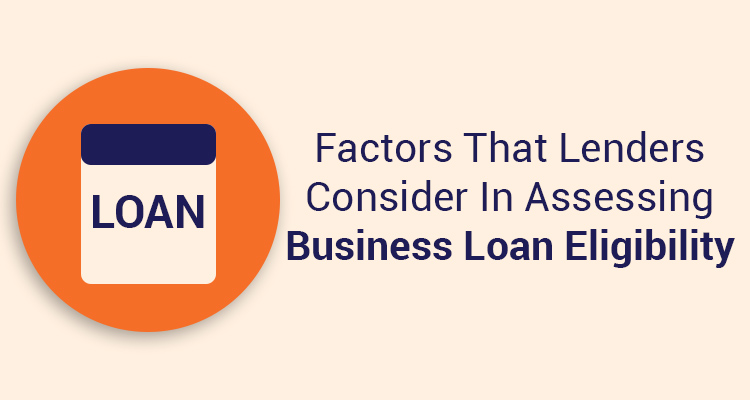Factors That Lenders Consider In Assessing Business Loan Eligibility

One of the main pillars of any business venture is finance and capital. At the time of starting an enterprise, one needs finance to begin operations, buy machinery, set up an office and a host of other expenses. During the lifetime of an enterprise, external cash infusion is sometimes essential for survival and growth. It is at this time that a business loan comes in handy.
Today business loans are offered by several banks and NBFCs to micro, small and medium-sized enterprises subject to their fulfilling some basic minimum criteria. The application process for the non-traditional business loan is simple and, in most cases, online. In this blog we look at the basic parameters that lenders look at while assessing your business loan eligibility.
Business Age:
While the minimum age could be one year, many lenders prefer to provide business loans to businesses that have been running at least two to three years. IIFL for e.g., requires the business to be at least two years in operation. The older the business is with good cash flow and profitability, the easier it is to avail a loan with softer terms.Nature Of Business:
Banks and NBFCs are wary of lending to businesses operating in industries and sectors deemed weak or risky. The definition of weak and risky differs slightly from lender to lender. It also differs over time. Sometimes, a business may be considered safe in one geographical location and risky in another.Existing Debt:
The existing debt load is another factor that will be scrutinised at the time of loan processing. The heavier the debt load and debt to income ratio, the riskier your business will be considered. High levels of debt, as well as seeking credit from multiple sources, is interpreted as your inability to manage cash flows. With high levels of debt, lenders may require you to pledge a business or personal asset as collateral. Existing debt will also affect the interest rate you are charged, driving it upward.Sapna aapka. Business Loan Humara.
Apply NowCredit Score:
This is a measure of your credit worthiness. Most lenders look for a credit score of 750 and above for an unsecured business loan.
Cash Flow History:
Lenders will prefer to extend business loans to those enterprises with consistent cash flows and steady revenue streams. Invoices and debts lying unpaid for prolonged periods and unpaid taxes indicate to the lender your inability to manage your business obligations. Thus, you will be considered a risky borrower. You may either be refused a loan or asked to put up a collateral. Additionally, you are likely to be charged a higher rate of interest. Your cash flow also indicates the EMI you will be able to pay each month and the quantum of loan that you can avail.Business Strategy:
While submitting a business plan is not mandatory for all small business loans, a sound business plan does improve your chances of availing a loan. Lenders will assess your plan to see whether the business loan is being put to constructive use and how the infusion of cash will improve your business profitability in the long run. The business plan should project future cash flows as well as how the business loan EMIs will be paid.
To conclude, while it is relatively easy for small businesses to obtain loans nowadays, lenders will assess the above-mentioned criteria in order to finalise the loan amount, tenure and the rate of interest that you should be charged. If you perform well on the majority of the above criteria and are confident that a business loan will improve your business prospects, do get in touch with IIFL Finance and apply for our online Business Loan
Sapna aapka. Business Loan Humara.
Apply NowDisclaimer: The information contained in this post is for general information purposes only. IIFL Finance Limited (including its associates and affiliates) ("the Company") assumes no liability or responsibility for any errors or omissions in the contents of this post and under no circumstances shall the Company be liable for any damage, loss, injury or disappointment etc. suffered by any reader. All information in this post is provided "as is", with no guarantee of completeness, accuracy, timeliness or of the results etc. obtained from the use of this information, and without warranty of any kind, express or implied, including, but not limited to warranties of performance, merchantability and fitness for a particular purpose. Given the changing nature of laws, rules and regulations, there may be delays, omissions or inaccuracies in the information contained in this post. The information on this post is provided with the understanding that the Company is not herein engaged in rendering legal, accounting, tax, or other professional advice and services. As such, it should not be used as a substitute for consultation with professional accounting, tax, legal or other competent advisers. This post may contain views and opinions which are those of the authors and do not necessarily reflect the official policy or position of any other agency or organization. This post may also contain links to external websites that are not provided or maintained by or in any way affiliated with the Company and the Company does not guarantee the accuracy, relevance, timeliness, or completeness of any information on these external websites. Any/ all (Gold/ Personal/ Business) loan product specifications and information that maybe stated in this post are subject to change from time to time, readers are advised to reach out to the Company for current specifications of the said (Gold/ Personal/ Business) loan.



